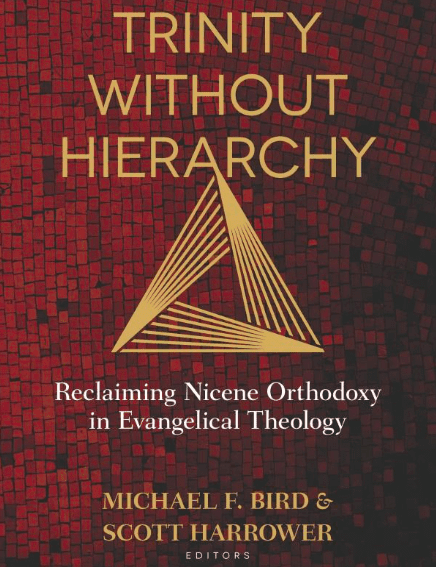This is the third post in the series on Michael Bird and Scott Harrower Trinity without Hierarchy: Reclaiming Nicene Orthodoxy in Evangelical Theology, a book that collects essays that both criticize what must be called a Complementarian sub-Trinitarianism and they also offer an alternative in the classical Trinitarian orthodoxy of the church.
I turn today to the post by Jules Martínez-Olivieri called “There is a Method to the Madness.”
Here’s the madness, a quote from Wayne Grudem:
Paul makes the parallel explicit when he says, “I want you to understand that the head of every man is Christ, the head of woman is her husband, and the head of Christ is God. Here is a distinction in authority. . . . Just as God the Father has authority over the Son, though the two are equal in deity, so in marriage, the husband has authority over his wife, though they are equal in personhood. In this case, the mans role is like that of God the Father, and the woman’s role is parallel to that of God to the Son.
To which Millard Erickson, Grudem’s former colleague at Bethel, said:
The problem is this: If authority over the Son is an essential, not an accidental, attribute of the Father, and subordination to the Father is an essential, not an accidental, attribute of the Son, then something significant follows. Authority is part of the Father s essence, and subordination is part of the Son’s essence, and each attribute is not part of the essence of the other person. That means that the essence of the Son is different from the essence of the Father… .That is equivalent to saying that they are not homoousios with one another.
That’s the madness about as clear as it gets. The Christology of Grudem reveals a method that quite frankly is not orthodox (see the essay in this volume by Peter Leithart). It moves from Father-Son relations in the economic Trinity (incarnation, redemptive work, etc) to the Father-Son relations in the immanent Trinity (seemingly in an exhaustive manner) and then sees in that a template for male-female relations now and forever.
Method discussions come and go but method for Martínez-Olivieri is vital, and here’s one of his opening claims:
So, for example, it is no secret that supporters of EFS are seeking to make explicit connections between Trinitarian relations and anthropology in an effort to anchor a complementarian ecclesiology as deriving from God’s internal life.3 Nevertheless, a desire to maintain a complementarian theology by appealing to divine ontology is problematic. Method and Christology will surface some of these maneuvers.
Some christologies are “from below” (beginning with the life of Jesus) and others “from above” (beginning with his deity). The relation of Father to Son inheres to this discussion. He makes this claim:
… faithful Christology is based on the depiction of God’s hypostatic activity in the economy of redemption, concurring with the creedal confessions of Nicaea and Chalcedon.
He thinks the Grudem crowd is trying to do high christology from below.
The particular concern for proponents of EFS of the Son is to demonstrate how to order human gendered relations under a hierarchical framework that finds origin in the Trinity. They do so by not only appealing to scriptural complementarity patterns of relationships between men and woman, but by grounding those in God’s life in himself. In this view God’s relational life becomes a prototype that should structure gendered relationships.
He points to the utter irony of this approach becoming like liberal theology:
In their optimism for finding in the doctrine of God a model for social and political configuration, the proponents of EFS de facto join a movement in modern theology, which for a myriad of reasons considers the Trinitarian relationality a metaphysical archetype for a “social program, or “egalitarian society,” or “democratic society,” or “a queer community,” or a “socialist Utopia.”
If this demonstrates anything, it is that the analogical use of the Trinitarian economy for human relationships is extremely difficult, if not outright subjective in many cases. And in the worst cases, it is completely ideological instead of theological.
A patient analysis of themes follows, leading to this conclusion:
Complementarians who use Trinitarian dogma to advance their own socio-ethical construals have joined the legion of theologians in modern theology, particularly in the liberal tradition, who have developed ways to conceive God’s life-in-act as an archetype for social organization. The now proverbial “the trinity is our social program,” echoed by Leonardo Boff, Jurgen Moltmann, Miroslav Wolf [sic!], and Catherine LaCugna, has been adopted in evangelical discussions in the north-Atlantic latitudes. Instead of using scriptural patterns of ordering ecclesiastical gendered relationships, or appealing to christological patterns of life, imitatio Christi, the Trinity is brought in to “close the deal.”
The economic Trinity communicates the immanent Trinity, but not exhaustively, and that is critical.
From the reception of divine revelation in and through Jesus the Son, it is problematic to deduce that God’s historical communication exhausts all that God is, or that God’s life is inevitably dependent on or constituted in the history of the world. God’s existence is fully in the eternal relationality of himself, independent from divine action in history. The missions of the Son and the Spirit—the creativity, servanthood, and sacrifice of Jesus and the sanctifying, regenerating work of the Spirit—are testified as a fruit of divine love and freedom.












